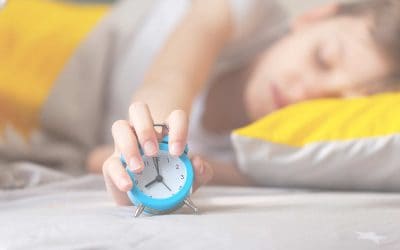How Much Sleep Do Babies Need?
From Newborn to Toddler Explained
This is a very common question that I field. Most often, it is asked by the sleep-deprived parents of even more sleep-deprived children. Of course every child is different, but there are some simple guidelines.
Newborn to one month – 15-20 hours a day
- Newborn sleep patterns: most newborns will be awake to feed (and, in fact, many feed while sleeping) and then it’s back to sleep. Baby sleep cycles usually range from 1-3 hours, waking to feed in between. Babies with colic may sleep for shorter periods.
- There may not be much of a pattern to newborn sleep at all, as their circadian rhythm is just not yet imprinted. Therefore, most newborns will sleep equally in the day and night, and sometimes (much to their parents’ chagrin), even more during the day.
1-4 months – 14-18 hours a day
- Regular sleep patterns begin to emerge at 6-8 weeks. Some babies will sleep 4-6 hours at a time by this threshold. Fewer babies have their days and nights mixed up by 3 months.
4-12 months – 12-15 hours a day
- Now is the time to establish healthy sleep patterns.
- Many babies have a baby sleep regression during this time.
- My personal sleep technique is to put babies to bed between 7 and 8pm, aiming at a wake time of 7 or 8am, with one feeding in the middle of the night (such as a dream feed), at 11pm or midnight.
- When do babies sleep through the night? Many babies will require one feeding during the night till 7-10 months, and then can sleep 12 hours without requiring another feeding.
- Babies should sleep 12 hours at night and 2-4 hours during the day
- 3 naps a day will drop to 2 naps a day around 6 months
- Typical nap times are at 9am, 1pm and 4pm
- Babies drop to one nap between 12-20 months
- Typically at 9am and 1pm
1-3 years – 12-14 hours a day
- By this point, most children are sleeping 11-13 hours a night and napping once in the afternoon
- Toddlers should go to bed between 7-8pm, with a wake time of 7-8 AM
- Most toddlers will drop their PM nap by age 3, though some will still nap till age 5 or longer.
- Some children this age will have trouble staying asleep or in their beds, and will search out parents to settle them.
3-6 years – 10-12 hours a day
- These children should still be sleeping around 12 hours at night, with few having naps
- This is the peak age of nightmares and night terrors
7-12 years – 10-11 hours a day
- These children tend to go to bed slightly later, from 9-10pm, sleeping till 7-8am
12-18 years – 8-10 hours per day
- Though some think that adolescents need more sleep than earlier ages as they go through social changes and puberty, most teens get few hours of sleep.
- Many parents will assume their teen suffers from excessive sleeping, though this may be normal and part of typical adolescence.
In summary – our children, (and parents, as a result) frequently get too few hours of sleep, and are consequently more emotionally labile, stressed and do not function at their highest level. We should all be striving for more sleep!
To learn more about sleep techniques for your child, nightmares and night terrors and how to create the ideal sleep environment for your child follow these links.
Dina is a wife, mother of 4, and adrenaline junky. She loves to share children’s health information from her professional and personal experience. More About Dr Dina.














